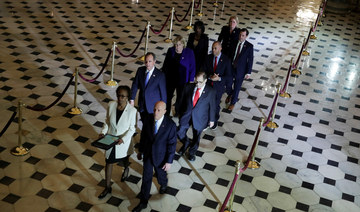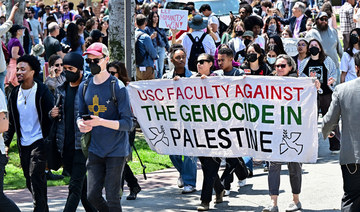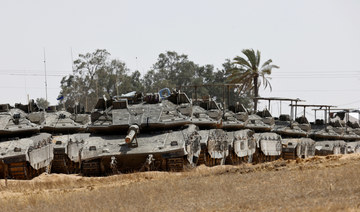WASHINGTON: The Senate narrowly rejected Democratic demands to summon witnesses for President Donald Trump’s impeachment trial late Friday, all but ensuring Trump’s acquittal in just the third trial to threaten a president’s removal in US history. But senators pushed off final voting on his fate to next Wednesday.
The delay in timing showed the weight of a historic vote bearing down on senators, despite prodding by the president eager to have it all behind him in an election year and ahead of his State of the Union speech Tuesday night.
Trump and Senate Majority Leader Mitch McConnell spoke by phone to lock in the schedule during a tense night at the Capitol as rushed negotiations proceeded on and off the Senate floor. The trial came to a standstill for about an hour. A person unauthorized to discuss the call was granted anonymity to describe it.
The president wanted to arrive for his speech at the Capitol with acquittal secured, but that will not happen. Instead, the trial will resume Monday for final arguments, with time Monday and Tuesday for senators to speak. The final voting is planned for 4 p.m. Wednesday, the day after Trump’s speech.
Trump’s acquittal is all but certain in the Senate, where his GOP allies hold the majority and there’s nowhere near the two-thirds needed for conviction and removal.
Nor will he face potentially damaging, open-Senate testimony from witnesses.
Despite the Democrats’ singular focus on hearing new testimony, the Republican majority brushed past those demands and will make this the first impeachment trial without witnesses. Even new revelations Friday from former national security adviser John Bolton did not sway GOP senators, who said they’d heard enough.
That means the eventual outcome for Trump will be an acquittal “in name only,” said Rep. Val Demings, D-Fla., a House prosecutor, during final debate.
Trump was impeached by the House last month on charges that he abused power and obstructed Congress as he tried to pressure Ukraine to investigate Democratic rival Joe Biden, using military aid as leverage as the ally fought Russia. He is charged with then blocking the congressional probe of his actions.
Senators rejected the Democrats’ effort to allow new witness es, 51-49, a near party-line vote. Republicans Susan Collins of Maine and Mitt Romney of Utah voted with the Democrats, but that was not enough.
Senate Democratic leader Chuck Schumer called that decision “a tragedy on a very large scale.” Protesters’ chants reverberated against the walls of the Capitol.
But Republicans said Trump’s acquittal was justified and inevitable.
“The sooner the better for the country,” said Sen. Lindsey Graham, a Trump confidant. “Let’s turn the page.”
The next steps come in the heart of presidential campaign season before a divided nation. Democratic caucus voting begins Monday in Iowa, and Trump gives his State of the Union address the next night. Four Democratic candidates have been chafing in the Senate chamber rather than campaigning.
The Democrats had badly wanted testimony from Bolton, whose forthcoming book links Trump directly to the charges. But Bolton won’t be summoned, and none of this appeared to affect the trial’s expected outcome. Democrats forced a series of new procedural votes late Friday to call Bolton and White House acting chief of staff Mick Mulvaney, among others, but all were rejected.
In an unpublished manuscript, Bolton has written that the president asked him during an Oval Office meeting in early May to bolster his effort to get Ukraine to investigate Democrats, according to a person who read the passage and told The Associated Press. The person, who was not authorized to disclose contents of the book, spoke only on condition of anonymity.
In the meeting, Bolton said the president asked him to call new Ukrainian President Volodymyr Zelenskiy and persuade him to meet with Trump’s personal lawyer, Rudy Giuliani, who was planning to go to Ukraine to coax the Ukrainians to investigate the president’s political rivals. Bolton writes that he never made the call to Zelenskiy after the meeting, which included acting chief of staff Mick Mulvaney and White House Counsel Pat Cipollone.
The revelation adds more detail to allegations of when and how Trump first sought to influence Ukraine to aid investigations of his rivals that are central to the abuse of power charge in the first article of impeachment.
The story was first reported Friday by The New York Times.
Trump issued a quick denial.
“I never instructed John Bolton to set up a meeting for Rudy Giuliani, one of the greatest corruption fighters in America and by far the greatest mayor in the history of NYC, to meet with President Zelenskiy,” Trump said. “That meeting never happened.”
Key Republican senators said even if Trump committed the offenses as charged by the House, they are not impeachable and the partisan proceedings must end.
“I didn’t need any more evidence because I thought it was proved that the president did what he was charged with doing,” retiring GOP Sen. Lamar Alexander of Tennessee, a late holdout, told reporters Friday at the Capitol. “But that didn’t rise to the level of an impeachable offense.”
Republican Sen. Lisa Murkowski of Alaska said she, too, would oppose more testimony in the charged partisan atmosphere, having “come to the conclusion that there will be no fair trial in the Senate.” She said, “The Congress has failed.”
Eager for a conclusion, Trump’s allies nevertheless suggested the shift in timing to extend the proceedings into next week, acknowledging the significance of the moment for senators who want to give final speeches.
Senate Majority Leader Mitch McConnell made the offer to Schumer, but it was not yet final.
Under the proposal, the Senate would resume Monday for final arguments, with time Monday and Tuesday for senators to speak. The final voting would be Wednesday.
To bring the trial toward a conclusion, Trump’s attorneys argued the House had already heard from 17 witnesses and presented its 28,578-page report to the Senate. They warned against prolonging it even further after House impeached Trump largely along party lines after less than thee months of formal proceedings making it the quickest, most partisan presidential impeachment in US history.
Some senators pointed to the importance of the moment.
“What do you want your place in history to be?” asked one of the House managers, Rep. Jason Crow, D-Colorado, a former Army Ranger.
Trump is almost assured of eventual acquittal with the Senate nowhere near the 67 votes needed for conviction and removal.
To hear more witnesses, it would have taken four Republicans to break with the 53-seat majority and join with all Democrats in demanding more testimony. But that effort fell short.
Chief Justice John Roberts, in the rare role presiding over the impeachment trial, could break a tie, but that seems unlikely. Asked late Friday, he told senators it would be “inappropriate.”
Murkowski noted in announcing her decision that she did not want to drag the chief justice into the partisan fray.
Though protesters stood outside the Capitol, few visitors have been watching from the Senate galleries.
Bolton’s forthcoming book contends he personally heard Trump say he wanted military aid withheld from Ukraine until it agreed to investigate the Bidens. Trump denies saying such a thing.
The White House has blocked its officials from testifying in the proceedings and objected that there are “significant amounts of classified information” in Bolton’s manuscript. Bolton resigned last September — Trump says he was fired — and he and his attorney have insisted the book does not contain any classified information.
Trump acquittal now likely Wednesday; Senate blocks witnesses
https://arab.news/m2urz
Trump acquittal now likely Wednesday; Senate blocks witnesses

- Trump and Senate Majority Leader Mitch McConnell spoke by phone to lock in the schedule during a tense night at the Capitol
- The Republican majority brushed past Democrats demands and will make this the first impeachment trial without witnesses
Dutch police end a pro-Palestinian demonstration at Amsterdam university
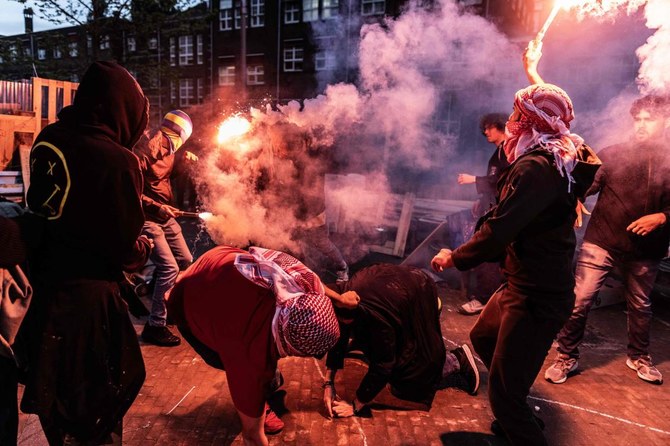
- Police said they had to act to stop the event and dismantle tents that been set up by protesters
- Outgoing Education minister Robbert Dijkgraaf said universities are a place for dialogue and debate and he was sad to see police had to intervene
AMSTERDAM: Dutch riot police ended a pro-Palestinian demonstration at an Amsterdam university early on Tuesday, arresting some 125 people in sometimes violent clashes, authorities said.
In messages posted overnight on social media X, police said they had to act to stop the event and dismantle tents that been set up by protesters, who used violence against police at the site.
“The police’s input was necessary to restore order. We see the footage on social media. We understand that those images may appear as intense,” police said.
Local media showed demonstrators shooting fireworks at police officers but there were no immediate reports of injuries on either side.
“All is now quiet ... police stay in the vicinity of the Roeterseiland campus,” police said later on X.
Outgoing Education minister Robbert Dijkgraaf said universities are a place for dialogue and debate and he was sad to see that police had to intervene.
Student protests over the war and academic ties with Israel have begun to spread across Europe but have remained much smaller in scale than those seen in the United States.
Last Friday, police in Paris entered France’s prestigious Sciences Po university and removed student activists who had occupied its buildings.
More than 100 students occupy the Ghent university, in Belgium, in both a climate and a Gaza protest that they want to prolong until Wednesday.
India election: Inside Modi and BJP’s plan to win a supermajority
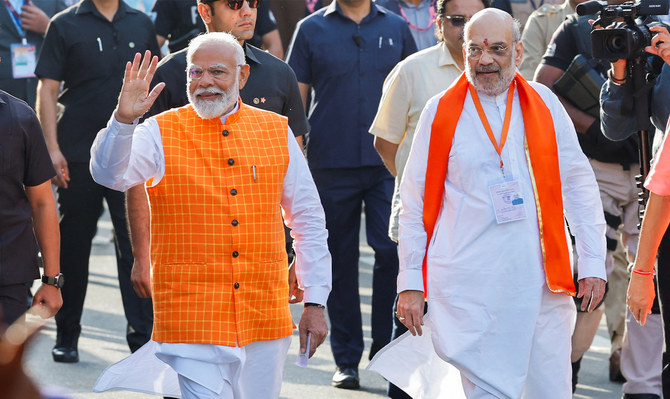
- Hindu nationalist BJP party and its allies are targeting 400 of 543 seats in India’s lower house of parliament
- Only once has a party crossed 400 mark, when Congress won following assassination of Indira Gandhi in 1984
BARPETA/THIRUVANANTHAPURAM, India: As India votes in a six-week general election, Narendra Modi’s image adorns everything from packs of rice handed out to the poor to large posters in cities and towns.
His Bharatiya Janata Party (BJP) is relying on the prime minister’s popularity as it seeks a super-majority in India’s parliament. Its message: Modi has delivered economic growth, infrastructure upgrades and India’s improved standing in the world.
But as the Hindu nationalist party and its allies target 400 of the 543 seats in India’s lower house of parliament — up from 352 won in 2019 — they are also employing local tactics in some vital constituencies they hope to wrest from the opposition.
Opinion polls indicate Modi will win a rare third term when voting ends on June 1. But only once in Indian history has a party crossed the 400 mark — when the center-left Congress party romped to victory following the assassination of its leader Indira Gandhi in 1984.
To examine how the right-wing National Democratic Alliance (NDA) aims to achieve that feat — and the obstacles it faces — Reuters spoke to nine NDA officials, three opposition leaders and two political analysts, as well as voters in six opposition-held seats the alliance is targeting.
They identified three of the BJP’s key tactics: enlisting celebrity candidates to unseat veteran opposition lawmakers; making an assault on the opposition’s southern strongholds by appealing to minorities such as Christians; and exploiting redrawn political boundaries that bolster the Hindu electorate in some opposition-controlled areas in the north.
“A combination of strategies, organizational commitment and tactical flexibility will help make inroads in seats never held by the party ever before,” BJP President J. P. Nadda, who oversees the party’s election strategy, told Reuters in April.
Some critics have warned the BJP would use a large majority to push through a more radical agenda in a third term. While the BJP’s manifesto focuses heavily on economic growth, it has also pledged to scrap separate legal codes for religious and tribal groups in areas such as marriage and inheritance.
Many Muslims and tribal groups oppose the plan, which would require a constitutional amendment to be passed by at least two-thirds of parliament.
“Modi wants a landslide majority only to be able to end the debate and deliberation on any policy matter in the parliament,” Congress party president Mallikarjun Kharge told Reuters.
Following low turnout in early voting, some BJP campaign officials have in recent days appeared less confident of securing a huge majority, though the party still expects to form the next government.
SOUTHERN STRATEGY
Modi’s party has criticized the dynastic politics that it says afflicts Congress, long dominated by the Nehru-Gandhi family. But in Pathanamthitta, a seat in the southern state of Kerala, it is fielding a political scion in Anil Antony — son of a veteran Congress leader.
The constituency, home to a sizeable Christian minority, has been held by Congress since its creation in 2009.
Anil’s father, former defense minister A.K. Antony, supports the incumbent and has denounced his son, a fellow Christian, for representing the Hindu nationalist party.
But Anil has another supporter: Modi, who came to Pathanamthitta in March and praised the BJP candidate for his “fresh vision and leadership.” The prime minister has visited the five states of southern India at least 16 times since December.
Nadda, the BJP president, acknowledged that winning a supermajority would require performing well in the five southern states, which are home to about 20 percent of India’s population but have not traditionally voted for his party.
In 2019, the NDA won just 31 of 130 seats across Andhra Pradesh, Karnataka, Kerala, Tamil Nadu and Telangana, all of which are linguistically diverse and have many Muslim and Christian voters.
Jiji Joseph, general secretary of the BJP’s minority wing in Kerala, said the party has made a concerted push for the 18 percent of voters there who are Christians. The BJP did not win a single seat in Kerala at the last general election.
“The BJP launched active contact with the Church and we started interacting with clergies directly,” he said, adding that the party now has 11,000 active Christian members. “There is a change. Christians now want to believe that BJP stands for them.”
In April, Anil became the first BJP candidate in Kerala to be endorsed by Christian leaders. He told Reuters his selection indicated the party offered opportunities to members from minority groups. He declined to comment on relations with his father.
Jayant Joseph, a Keralan Christian voter, said he backed the BJP because he had read media reports about Muslim men marrying Christian women and converting them to Islam. Most moderate Hindus consider allegations of large-scale forced conversions to be a conspiracy theory.
“Kerala is a secular state,” he said. “But for it to continue to be a secular state, the Muslim population and their conversion strategy must be kept under check.”
A Modi political aide, who spoke on condition of anonymity because he was not authorized to talk to media, said the NDA expects to win about 50 seats in the south.
K. Anil Kumar, a senior leader of Kerala’s ruling Communist Party of India (Marxist), said he did not believe BJP would do well in his state, which he said has a strong tradition of secularism.
“The BJP might try to side with the Christians on some issues but they are fundamentally a party of the Hindus and for the Hindus,” he said.
STAR CANDIDATES
In the Mandi constituency of the northern state of Himachal Pradesh, the BJP has recruited Bollywood actress Kangana Ranaut to break the Congress party’s grip on power. Congress is fielding as its candidate Vikramaditya Singh, whose mother currently represents the constituency. His father was the state’s long-time chief minister.
Ranaut, a political novice who calls herself a “glorious right-wing” personality, has starred in popular movies with nationalistic themes. She is known for her criticism of Bollywood executives who she said favored the relatives of famous actors for opportunities.
The actress is one of five actors running for the BJP this year, up from four in 2019.
No opinion polling on the Mandi race is publicly available.
Anjana Negia, an elementary school teacher who plans to vote for Ranaut, acknowledged that her preferred candidate had no political experience. But she said that she valued a new face and that a Modi-backed candidate would help “bring a fresh wave of development.”
Fielding celebrities and seeking the endorsement of entertainment personalities is relatively new for the BJP, which “long resisted such tactics because of its cadre-based nature” that prized grassroots efforts, said Milan Vaishnav, an expert on South Asian politics at the Carnegie Endowment for International Peace think-tank.
Ranaut declined an interview request. Federal BJP spokesman Shahzad Poonawala said she “has been successful in exposing dynastic culture and nepotism in Bollywood and now she is doing the same in politics.”
Singh, a state minister responsible for urban development, told Reuters that his family’s experiences gave him a better understanding of politics. Charges of nepotism were “shallow,” he said.
REDISTRICTING BENEFITS
The NDA is hoping for gains in the northeastern state of Assam, where it won nine of 14 seats in 2019. Assam’s BJP chief minister, Himanta Biswa Sarma, said in March he was confident of winning 13 seats.
The NDA’s confidence is rooted in a 2023 redistricting exercise in the state. India’s non-partisan Election Commission routinely redraws seat boundaries to reflect population changes; it is tasked with ensuring that no political party gains undue advantage from the changes.
But exercises since the last federal election in Assam and far-northern Jammu and Kashmir, India’s only majority Muslim region, diluted the Muslim vote in seats that the NDA is targeting, according to three BJP and four opposition officials.
The Election Commission declined to comment on the two exercises, citing the ongoing election.
In Assam, the NDA has high hopes for Congress-held Barpeta, which alliance candidate Phani Bhushan Choudhury said newly includes dozens of villages and some towns with large Hindu populations.
“Earlier (Barpeta) had a Muslim majority but now it is a Hindu majority,” said Choudhury. “That change has worked in my favor.”
He estimates that there are now 1.2 million Hindu voters in Barpeta, where he is campaigning on development and protecting the rights of what the NDA calls “indigenous Assamese” voters, who are mostly Hindu.
Choudhury’s Congress opponent Deep Bayan said the percentage of Hindus in Barpeta went from 30 percent to 70 percent. “Instead focusing on real issues affecting the people...(the BJP does) the politics of polarization,” he said.
Three of Jammu and Kashmir’s five seats are majority Muslim and held by the opposition. But the NDA hopes to swing one of them, Anantnag-Rajouri, after its voter rolls swelled by more than 50 percent to over 2 million, according to government data.
Many of the new voters are Hindus or from regional tribes — which benefited from new BJP policies awarding them education and employment privileges — according to regional BJP chief Ravinder Raina.
Raina said the BJP would support an NDA partner that it believed could win Anantnag-Rajouri and focus on retaining the two Hindu-majority seats it holds.
The two redistricting exercises presages a broader remapping of constituencies due after the election.
Vaishnav, of the Carnegie Endowment, said the remapping would distribute seats to the BJP-dominated north, which has much higher population growth rates, to the detriment of wealthier south India.
Indian PM Modi says he does not oppose Islam, Muslims as election campaign heats up
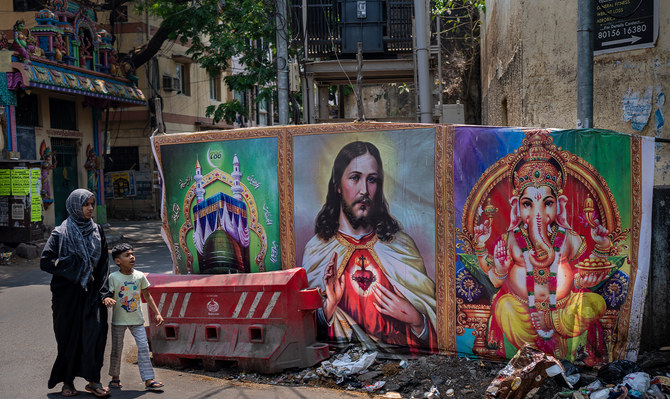
- Modi’s critics accuse him and his party of targeting India’s minority Muslims for electoral gains
- Allegations grew after Modi referred to Muslims recently as “infiltrators” who have “more children”
NEW DELHI: Indian Prime Minister Narendra Modi has said he does not oppose Islam or Muslims and wants the community to think about their future growth as they vote in an ongoing general election that completes its third phase on Tuesday.
Modi’s critics accuse him and his party of targeting minority Muslims for electoral gains and the allegations grew after Modi referred to Muslims in a recent speech as “infiltrators” who have “more children.”
He denied discriminating against Muslims and has linked his recent comment to what he described as the opposition Congress party’s election plan to redistribute the wealth of majority Hindus among Muslims. The Congress denies making any such promise.
“We are not opposed to Islam and Muslims,” Modi told broadcaster Times Now in an interview aired on Monday. “The opposition is looking after its own benefit. Muslim community is intelligent... the opposition is worried that their lies have been caught.”
Modi is seeking a rare third straight term in the seven-phase election that started on April 19 and ends on June 1. Eleven states and territories will vote in the third phase on Tuesday and surveys suggest Modi will win comfortably when results are declared on June 4.
His campaign began by showcasing economic achievements of the past 10 years but changed tack after the first phase of voting and focused more on firing up his Bharatiya Janata Party’s Hindu base by attacking rivals as pro-Muslim.
“I want to say to the Muslim community: introspect, think. The country’s progressing, if you feel any shortcomings in your community, what is the reason behind it? Why didn’t you get government benefits in the time when Congress was in power?“
Analysts say Modi and his Hindu nationalist party have made controversial remarks to invigorate their hard-line base as the election sees comparatively low voter turnout from previous years. Surveys say jobs and inflation are the main concerns of voters.
“Think of your children and your own future,” Modi said, referring to Muslims and the elections. “I don’t want any community to live like laborers because someone is scaring them.”
PM Modi votes as India’s marathon election heats up

- Modi’s ruling Bharatiya Janata Party is expected to win India’s election convincingly
- Indian PM has stepped up rhetoric on India’s main religious divide in bid to rally voters
AHMEDABAD, India: Hindu nationalist Prime Minister Narendra Modi cast his ballot Tuesday in India’s ongoing general election after giving several inflammatory campaign speeches accused of targeting minority Muslims.
Turnout so far has dropped significantly compared with the last national poll in 2019, with analysts blaming widespread expectations that Modi will easily win a third term and hotter-than-average temperatures heading into the summer.
Modi walked out of a polling booth early morning in the city of Ahmedabad while holding up a finger marked with indelible ink, flanked by security personnel and cheered by supporters.
“Voted in the 2024 Lok Sabha elections,” Modi said on social media platform X, referring to India’s lower house of parliament.
“Urging everyone to do so as well and strengthen our democracy.”
The premier’s ruling Bharatiya Janata Party (BJP) is expected to win the election convincingly, but since the vote began on April 19, Modi has stepped up his rhetoric on India’s main religious divide in a bid to rally voters.
He has used public speeches to refer to Muslims as “infiltrators” and “those who have more children,” prompting condemnation from opposition politicians, who have complained to election authorities.
Modi has also accused Congress, the main party in the disparate opposition alliance competing against him, of planning to reallocate the nation’s wealth to Muslim households.
“This is the first time in a long time that he is so direct,” said Hartosh Singh Bal, executive editor at news magazine The Caravan.
“I haven’t seen him be this directly bigoted, usually he alludes to bigotry,” he added.
“The comments on wealth redistribution are targeting something from the Congress manifesto that just does not exist and that is frankly quite unfortunate.”
Modi remains widely popular a decade after coming to power, in large part due to his government’s positioning the nation’s majority faith at the center of its politics, despite India’s officially secular constitution.
In January, the prime minister presided over the inauguration of a grand temple to the deity Ram, built on the site of a centuries-old mosque razed by Hindu zealots decades earlier.
Construction of the temple fulfilled a long-standing demand of Hindu activists and was widely celebrated across India, with extensive television coverage and street parties.
Modi’s brand of Hindu-nationalist politics has in turn made India’s 220-million-plus Muslim population increasingly anxious about their future in the country.
The election commission has not sanctioned Modi for his remarks despite its code of conduct prohibiting campaigning on “communal feelings” such as religion.
India’s election is conducted in seven phases over six weeks to ease the immense logistical burden of staging the democratic exercise in the world’s most populous country.
Much of southern Asia was hit by a heatwave last week that saw several constituencies vote in searing temperatures.
In the city of Mathura, not far from the Taj Mahal, temperatures crossed 41 degrees Celsius (106 degrees Fahrenheit) on polling day, and election commission figures showed turnout dropping nearly nine points to 52 percent from five years earlier.
An analysis of turnout data published by The Hindu newspaper concluded it was too early to determine whether hot weather was impacting voter participation.
But India’s weather bureau has forecast more heatwave spells to come in May and the election commission formed a taskforce last month to review the impact of heat and humidity before each round of voting.
High temperatures were forecast for several locations voting on Tuesday including the states of Madhya Pradesh and Bihar.
Years of scientific research have found climate change is causing heatwaves to become longer, more frequent and more intense.
More than 968 million people are eligible to vote in the Indian election, with the final round of polling on June 1 and results expected three days later.
Ground invasion of Rafah would be ‘intolerable,’ UN chief warns

- Israel has killed more than 34,700 Palestinians, around two-thirds of them children and women, according to Gaza health officials
UNITED NATIONS, United States: A ground invasion of Rafah would be “intolerable,” UN Secretary-General Antonio Guterres said Monday, calling on Israel and Hamas “to go an extra mile” to reach a ceasefire deal.
“This is an opportunity that cannot be missed, and a ground invasion in Rafah would be intolerable because of its devastating humanitarian consequences, and because of its destabilizing impact in the region,” Guterres said as he received Italian President Sergio Mattarella.



